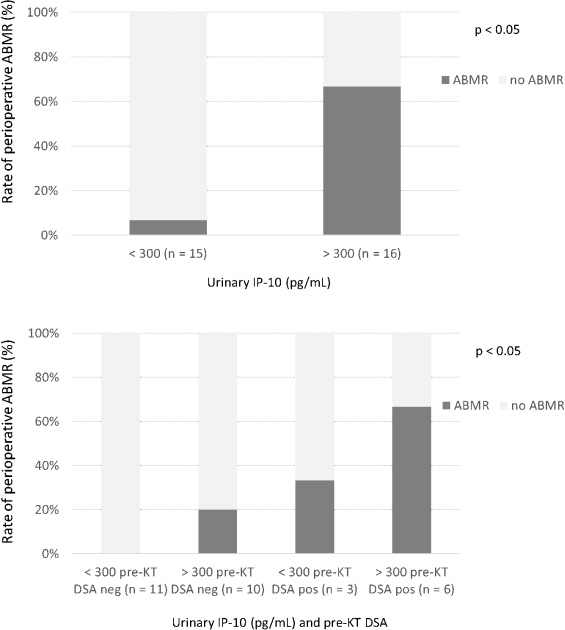Urine IP-10 as the Biomarker for ABMR in Kidney Transplant Recipient with DGF.
1Department of Medicine, Division of Nephrology, Chulalongkorn University and King Chulalongkorn Memorial Hospital, Bangkok, Thailand
2Department of Microbiology, Chulalongkorn University and King Chulalongkorn Memorial Hospital, Bangkok, Thailand
3Department of Surgery, Chulalongkorn University and King Chulalongkorn Memorial Hospital, Bangkok, Thailand.
Meeting: 2016 American Transplant Congress
Abstract number: C29
Keywords: Antibodies, Kidney transplantation, Monitoring, Rejection
Session Information
Session Name: Poster Session C: Antibody Mediated Rejection: Session #1
Session Type: Poster Session
Date: Monday, June 13, 2016
Session Time: 6:00pm-7:00pm
 Presentation Time: 6:00pm-7:00pm
Presentation Time: 6:00pm-7:00pm
Location: Halls C&D
Background: In the setting of DGF in kidney transplantation (KT), early acute ABMR, which needs early treatment, has to be differentiated from simple ischemic acute tubular necrosis (ATN). Concerning the higher risk of bleeding complication during this period, the clinician is reluctant to perform kidney biopsy. The biomarkers are needed for acute ABMR prediction during this vulnerable period.
Methods: There were 115 incident recipients during September 2012 to December 2014, which all of them were negative for CDC-AHG crossmatch. The total number of recipients with DGF were enrolled (n=31). None of them underwent desensitization prior transplantation. The urine IP-10 (also called CXCL-10) at day 7 were measured by ELISA method in all DGF recipients. The allograft biopsy was performed at day 7 for detection of ABMR. Recipients were stratified in to four groups according to pre-KT DSA status and urine IP-10 level.
Results: None of our patients was anuria at day 7 after transplantation. Seven of 31 DGF recipients had ABMR (22.6%). The median urine IP-10 level of 31 recipients was 326.6 pg/mL (range from 0 to 6999 pg/mL). Based on ROC analysis, the most optimal cut point for low vs high IP-10 level was at 300 pg/mL with 85.7% sensitivity and 58.3% specificity. The recipients with high IP-10 level had significantly higher rate of ABMR compared to low IP-10 recipients  . The rates of ABMR among negative pre-KT DSA/low IP-10, negative DSA/high IP-10, positive DSA/low IP-10, and positive DSA / high IP-10 recipients were 0, 20.0, 33.5 and 66.7%, respectively (p<0.05).
. The rates of ABMR among negative pre-KT DSA/low IP-10, negative DSA/high IP-10, positive DSA/low IP-10, and positive DSA / high IP-10 recipients were 0, 20.0, 33.5 and 66.7%, respectively (p<0.05).
Conclusions: During DGF period, the perioperative ABMR can be predicted by urine IP-10 at day 7. Together with pre-KT DSA, urine IP-10 provides additional predictive value for perioperative ABMR prediction.
CITATION INFORMATION: Townamchai N, Leelahavanichakul A, Supapol J, Wattanatorn S, Avihingsanon Y, Praditpornsilpa K. Urine IP-10 as the Biomarker for ABMR in Kidney Transplant Recipient with DGF. Am J Transplant. 2016;16 (suppl 3).
To cite this abstract in AMA style:
Townamchai N, Leelahavanichakul A, Supapol J, Wattanatorn S, Avihingsanon Y, Praditpornsilpa K. Urine IP-10 as the Biomarker for ABMR in Kidney Transplant Recipient with DGF. [abstract]. Am J Transplant. 2016; 16 (suppl 3). https://atcmeetingabstracts.com/abstract/urine-ip-10-as-the-biomarker-for-abmr-in-kidney-transplant-recipient-with-dgf/. Accessed July 9, 2025.« Back to 2016 American Transplant Congress
